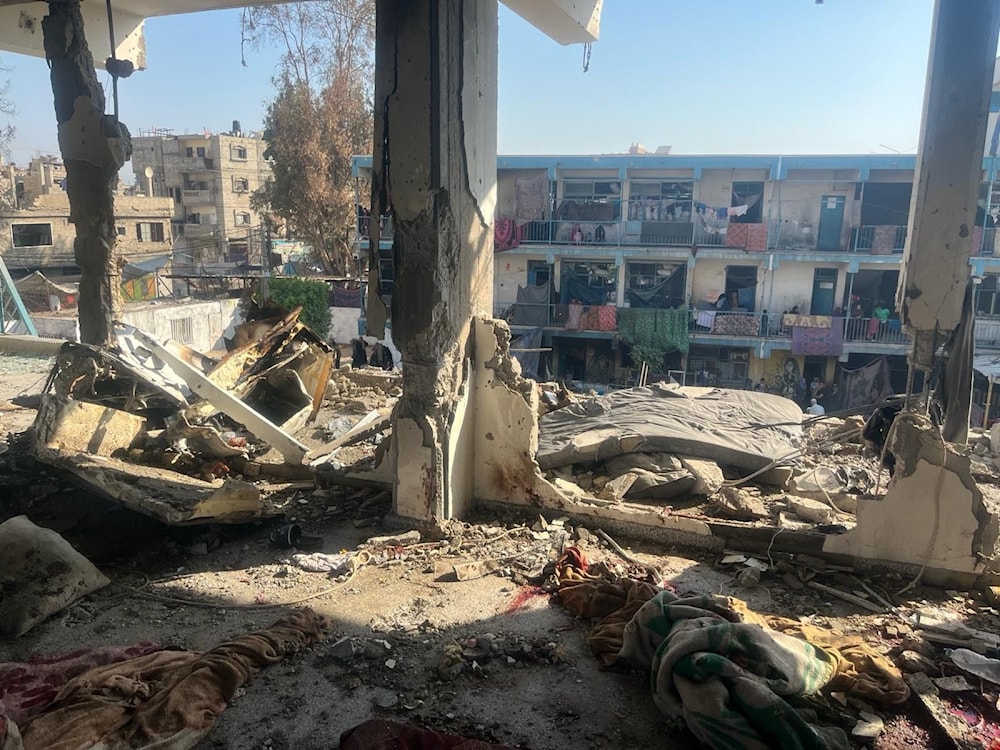UN official slams Western double standards over Nuseirat massacre
The UN's special rapporteur on the right to housing criticizes countries that celebrate the release of four Israeli captives while remaining silent about the hundreds of Palestinians killed in the attack.
-

UNRWA school-turned-shelter was attacked in Nuseirat, in the Middle Areas, overnight by Israeli forces without prior warning on June 6, 2024. (UNRWA)
The UN special rapporteur on the right to housing has criticized countries for their perceived bias regarding the ongoing Israeli aggression on Gaza, particularly in light of a recent Israeli massacre that left 274 Palestinians, mainly children, killed in cold blood on Saturday in Nuseirat refugee camp.
"Countries that celebrate the release of four Israeli hostages without saying a word about the hundreds of Palestinians killed and thousands held in arbitrary detention by Israel, have lost moral credibility for generations and don’t deserve to be on any UN human rights body," Balakrishnan Rajagopal said on X about the Israeli massacre that took place on Saturday.
Countries that celebrate the release of four Israeli hostages without saying a word about the hundreds of Palestinians killed and thousands held in arbitrary detention by Israel, have lost moral credibility for generations and don’t deserve to be on any UN human rights body.
— UN Special Rapporteur on the right to housing (@adequatehousing) June 8, 2024
This comes as Western leaders rejoiced over retrieved captives, forgetting the hundreds of Palestinians of all ages, including children, who were slaughtered and left to die under the rubble.
Read more: Scholz ignores Nuseirat massacre, says operation 'sign of hope'
Everyone in my family was either killed or injured: Nuseirat massacre
The shock and grief have suffocated the streets of the Nuseirat refugee camp after 274 Palestinians of all ages, yet mainly children, were massacred in cold blood on Saturday, as per Gaza's Health Ministry.
The harrowing images emerging from the recent massacre have reverberated across the globe, igniting a wave of widespread protests and demonstrations. From bustling city streets in Chicago to remote villages in Pakistan, people everywhere are united in their condemnation of the Israeli atrocities witnessed in Gaza.
Two eyewitnesses, Asia al-Nemer, searching for a pharmacy with the remaining stock of her sister's medication, and Ansam Haroun, aiming to purchase new clothes for her daughters to lift their spirits ahead of the upcoming Eid al-Adha holiday, recounted the horrors of the Israeli massacre, The Guardian reported.
Earlier in the year, this area of central Gaza had become deserted when Israeli troops passed through, demolishing Haroun's home in an airstrike. However, the area experienced since May a surge in population as over a million people were forcibly displaced northward to escape another Israeli aggression on the Nuseirat refugee camp.
"The Nuseirat market is always crowded, but now more than usual because of the many displaced people," said Haroun, 29, who is currently residing with an uncle.
She recounted as cited by The Guardian that she was browsing outfits for her daughters when the initial Israeli airstrikes commenced. Almost instinctively, she dashed out of the door to reach them.
Outside, she encountered a scene reminiscent of "the horrors of judgment day" with panicked crowds attempting to flee the impending onslaught. Soon, helicopters and quadcopter drones would join the assault, resulting in hundreds of casualties and bodies strewn across the streets, as depicted in images from the area.
“Everyone was screaming, terrified,” she said, as quoted by The Guardian.
“The street I was on was only 50 meters long, but it was packed with hundreds of people, all running. A woman next to me fainted from terror, and I saw vendors abandoning their goods on the roadside to flee,” she stressed.
El-Nemer, a 37-year-old software engineer originally from the northern part of Gaza, was also among the crowd of people witnessing the Israeli carnage.
“I was jogging along the street with other women. We were terrified,” she said.
They hurried past health clinics and schools, places where they might have sought refuge in the past but now avoided due to deliberate Israeli attacks on such facilities.
'All kinds of attacks in the area to cover up their cowardly operation'
Abu Youssef, aged 42, expressed that despite residing near the hospital, his family was not shielded from an airstrike that struck directly beside their home. Tragically, he had already lost his three other children earlier in the Israeli massacre, and doctors conveyed that his last surviving son had minimal chances of survival.
“Everyone in my family and my brothers’ families was either killed or injured. Three of my nieces died so far; my sister is still fighting for her life,” The Guardian quoted him as saying.
“My house is near Al-Awda Hospital,” he stressed. “Although it is hundreds of meters away from the building they targeted, there were a lot of airstrikes and all kinds of attacks in the area to cover up their cowardly operation.”
Unfortunately, this massacre is one of many since October 7, resulting in more than 37,000 fatalities to date. Meanwhile, the Israeli carnage seems to continue unabated.
Read next: 'Bodies were in pieces, scattered in the streets': Nuseirat massacre

 5 Min Read
5 Min Read










